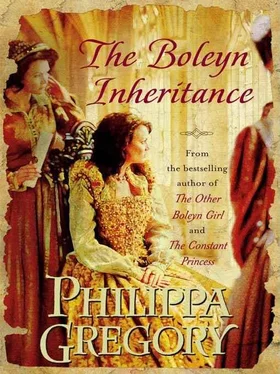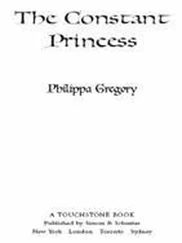Jane Boleyn, Ampthill,
October 1541
Her course started something like a week late, but I was not too disheartened. The mere thought of it had been enough to make the king more in love with her than ever, and she had at least agreed that though the sun rises and shines only on Thomas Culpepper, he does not have to be privy to every little secret.
She has behaved very prettily with the people whom she has met on this progress; even when she has been bored and inattentive, she has kept a pleasant smile on her face, and she has learned to follow a little behind the king and to maintain an appearance of demure obedience. She serves him in bed like a paid whore, and she sits next to him at dinner and never shows by a flicker of expression that he has broken wind. She is a selfish, stupid girl, but she might, given time, make quite a good queen. If she conceives a child and gives England a son, she might live long enough to learn to be a queen that is admired.
The king, at any rate, is mad about her. His indulgence makes our task of getting Culpepper in and out of her bedchamber so much easier. We had a bad night in Pontefract when he sent Sir Anthony Denny to her room without announcement, and she was locked in with Culpepper. Denny tried the door and went away without saying anything. There was another night when the king stirred in her bed while they were at their business only on the other side of the door, and she had to go flying back in to the old man, still damp with sweat and kisses. If the air had not been heavy with the stink of his wind, he would have smelled the scent of lust for certain. At Grafton Regis the lovers coupled in the jakes – Culpepper crept up the stairs to the stone-walled chamber that overhangs the moat, and she told her ladies that she was sick as a dog and spent the afternoon with him in there, frantically humping while the rest of us made possets. If it were not so dangerous, it would be funny. As it is, it still makes me breathless with a mixture of fear and lust when I hear them together.
I never laugh. I think of my husband and his sister and any laughter dies in my mouth. I think of his promising to be her man through any trouble. I think of her, desperate to conceive a son, sure that Henry could not give her one. I think of the unholy pact they must have made. Then, with a little moan, I think that all this is my fear, my fantasy, and perhaps it never happened. The worst thing about the two of them being dead is that now I will never know what happened. The only way I have borne the thought of what they did, and the part I played, in all these years has been to put the thought far from me. I never think of it, I never speak of it, and no one ever speaks of them in my hearing. It is as if they never were. That is the only way I can bear the fact that I am alive and they are gone: to pretend that they never were.
“So when Queen Anne Boleyn was accused of treason, did they really mean adultery?” Katherine asks me.
The question, so sharp on the point of my own thinking, is like a stab. “What d’you mean?” I ask.
We are riding from Collyweston to Ampthill on a bright, cold morning in October. The king is ahead, galloping with the young men of his court, thinking he is winning a race as they hold their horses back, Thomas Culpepper among them. Katherine is ambling along on her gray mare, and I am at her side on one of the Howard hunters. Everyone else has dropped back to gossip, and there is no one to shield me from her curiosity.
“You said earlier that she and the other men were accused of adultery,” she pursues.
“That was months ago.”
“I know, I have been thinking about it.”
“You think very slowly,” I say nastily.
“I know I do,” she says, quite unabashed. “And I have been thinking that they accused Anne Boleyn, my cousin, of treason only because she was unfaithful to the king, and they beheaded her.” She glances around her. “And I have been thinking that I am in the same situation,” she says. “That if anyone knew – they would say that I am unfaithful to the king. Perhaps they would call it treason, too. Then what would happen to me?”
“That is why we never say anything,” I reply. “That is why we take care. Remember? I have warned you from the beginning to take care.”
“But why did you help me meet Thomas? Knowing as you do what a danger it is? After your own sister-in-law was killed for just the same thing?”
I am lost for an answer. I never thought that she would ask me this question. But her stupidity is such that she does, sometimes, go straight to the most obvious. I turn my head as if I am looking over the cold meadows where the river, swollen with the recent rains, shines like a sword, a French sword.
“Because you asked me to help you,” I say. “I am your friend.”
“Did you help Anne Boleyn?”
“No!” I exclaim. “She would have no help of mine!”
“You were not her friend?”
“I was her sister-in-law.”
“Did she not like you?”
“I doubt she ever saw me from start to finish. She had no eyes for me.”
This does not halt her speculation, as I intended, but feeds it. I can almost hear the slow revolving of her thoughts.
“She didn’t like you?” Katherine asks. “She and her husband and her sister, they were always together. But they left you out.”
I laugh, but it doesn’t come out well. “You make it sound like children in the school yard.”
She nods. “That is just how it is in a royal court. And did you hate them for not letting you join them?”
“I was a Boleyn,” I say. “I was a Boleyn as much as they. I was a Boleyn by marriage; their uncle the duke is my uncle. My interests are in the family as theirs were.”
“So why did you give evidence against them?” she asks.
I am so shocked at her directly accusing me, I can hardly speak. I look at her. “Where did you hear of this? Why would you speak of this?”
“Catherine Carey told me,” she says, as if it is unremarkable that the two girls, all but children, should share confidences about treason and incest and death. “She said that you bore witness against your husband and his sister. You gave evidence to show that they were lovers and traitors.”
“I did not,” I whisper. “I did not.” I cannot bear her naming this; I never think of it. I will not think of it today. “It wasn’t like that,” I say. “You don’t understand because you are only a girl. You were a child when all this happened. I tried to save him; I tried to save her. It was a great plan of your uncle’s devising. It failed, but it should have succeeded. I thought that I would save him if I gave evidence, but it all went wrong.”
“Is that how it was?”
“It was heartbreaking!” I cry out in my pain. “I tried to save him, I loved him, I would have done anything for him.”
Her pretty young face is filled with sympathy. “You meant to save him?”
I dash the tears from my eyes with the back of my glove. “I would have died for him,” I say. “I thought I would save him. I was going to save him. I would have done anything to save him.”
“Why did it go wrong?” she whispers.
“Your uncle and I thought that if they pleaded guilty, she would be divorced and would be sent away, to a convent. We thought that he would be stripped of his title and his honors and banished. The men who were named with her were never guilty; everyone knew that. They were George’s friends and her courtiers, not lovers. We thought they would all be forgiven, as Thomas Wyatt was forgiven.”
“So what happened?”
It is like a dream, this retelling. It is the dream that comes to me often, that wakes me in the night like sickness, that sends me from my bed to walk and walk in the dark room until the first gray light comes into the sky and I know my ordeal is over.
Читать дальше
Конец ознакомительного отрывка
Купить книгу












